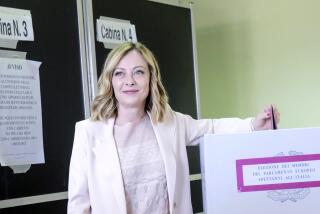East Bloc in Transition : Havel Appeals for Unity on Selection of Czech President : East Bloc: Opposition leaders feel the debate is distracting the nation from the more urgent problems of economic and political reforms.
- Share via
PRAGUE, Czechoslovakia — Vaclav Havel, Czechoslovakia’s opposition leader and likely future president, appealed in an extraordinary nationally televised address on Saturday for national unity and an end to political maneuvering over the presidential vacancy.
The nation, he said, cannot “afford the luxury of waiting and postponement.” The debate over the presidency, he added, should be completed “quickly, preferably by the end of the year.”
Havel’s words reflected the increasingly strong sense on the part of opposition leaders that debate over the presidency is distracting the country from the far more urgent problems of economic reform and rebuilding of a democratic political process.
Many in the opposition movement fear that delay and national drift could allow the Communists to regain strength. With the revolution here having occurred so rapidly, Havel said in a brief conversation with reporters Saturday night, even he sometimes wonders if it is real and lasting.
“I could wake up tomorrow in my cell and say to my fellow prisoners, ‘I had the most crazy dream,’ ” he said.
For many Czechoslovaks, Saturday’s speech was their first look at Havel, who only a few weeks ago was a dissident under constant police surveillance and shunned by the nation’s media.
“The world knows more about Mr. Havel than the Czechoslovak people do,” a television announcer said as she introduced the playwright turned political leader.
The Civic Forum opposition group that Havel heads has nominated him for the nation’s presidency, vacant since Communist President Gustav Husak resigned a week ago. But deputies in the Communist-dominated Federal Assembly, the nation’s parliament, have been balking and have suggested deferring the presidential choice until a national referendum sometime next year.
Students leaders opposed to this plan have threatened to hold massive demonstrations around the assembly building when the body next meets on Tuesday.
Havel used his speech to pressure deputies but also to reassure Communist Party members that he would not lead a retribution effort against them.
Speaking of the deputies, Havel was blunt. “If they do not want to risk chaos and spontaneous strikes and international shame,” he said, “I beg them not to complicate the situation and expose themselves to public condemnation.”
But his words about rank-and-file party members were gentler. “The totalitarian system used the Communist Party as a shield,” he said. And for that reason, those who were party members “have increased responsibility for the dilemmas” the nation now faces.
At the same time, he said, “millions of Communists do not form some foreign species.”
“More important than the party card you have in your pocket is whether you are a friend of the peaceful path to democracy or a friend of the old order.”
Havel spoke as he and his supporters continued extensive negotiations with Alexander Dubcek, the former Czechoslovak Communist Party chief who led the 1968 reform effort that was quashed by a Soviet-led invasion.
Dubcek is being pushed for the presidency by supporters in his native Slovakia, and Havel, who is Czech, has been keen to find a compromise under which some other job could be found for Dubcek to avoid creating a rift between the country’s two ethnic groups.
Havel praised Dubcek in his speech and said he would accept the presidency only if Dubcek were “by my side in whatever function.” Talks have centered around the possibility that Dubcek might assume another senior post in the government, such as head of the assembly.
Havel also conducted a lengthy discussion Saturday night with a third potential candidate, Cestmir Cisar, a former Dubcek aide.
Dubcek, questioned by reporters outside a reception at the Italian Embassy here, where he met with Havel, said the two would “march together hand in hand in this process.”
“The most important thing is harmony,” he added.
Havel also devoted a large portion of his speech to introducing himself. “For 20 years, it was official propaganda that I was an enemy of socialism, that I wanted to bring back capitalism, that I was in the service of imperialism, that I wanted to exploit people, that we have maids” cleaning his apartment, he said.
“All those were lies.”
“I always try to write the truth whether the government likes it or not,” he added. “I spent several months in jail for that.”
Wearing a rare tie and a jacket with a Civic Forum button on the lapel and reading from a prepared text, Havel appealed to national pride as he urged his countrymen not to fear the future.
The rapid events of the last month have proven, he said, that “our civic culture was dampened down, but not eliminated. The people were dreaming, sleeping, waiting for this moment.”
“The path we take,” he said, “will lead to a better future not only for our country but for Europe and the world. Our country will cease to be a laughingstock and become the object of interest and respect.”
More to Read
Sign up for Essential California
The most important California stories and recommendations in your inbox every morning.
You may occasionally receive promotional content from the Los Angeles Times.












